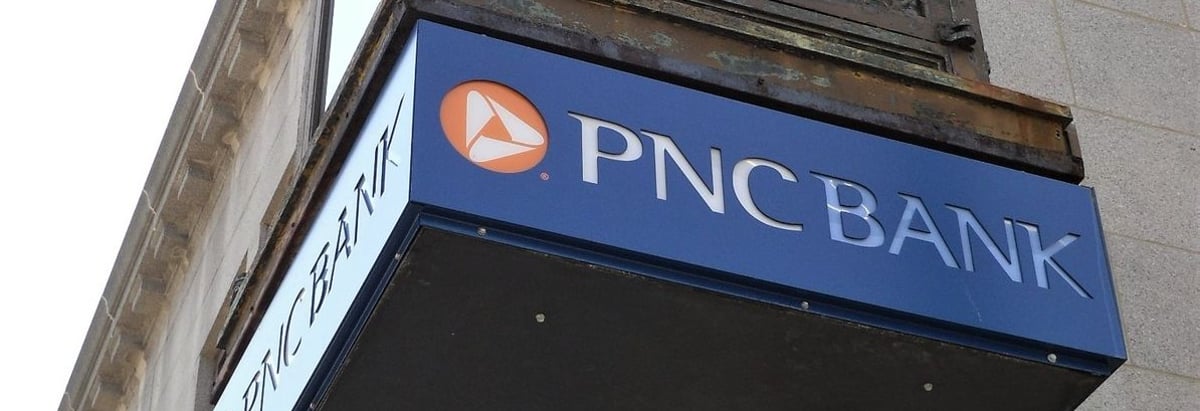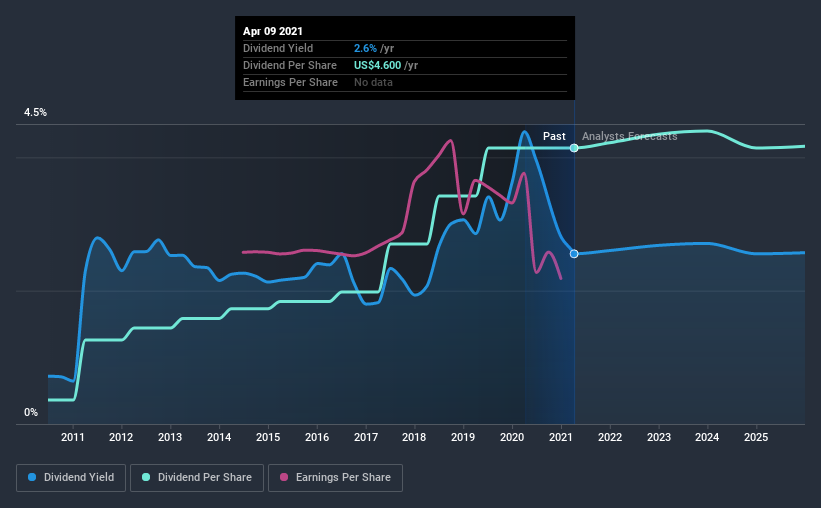- United States
- /
- Banks
- /
- NYSE:PNC
Don't Buy The PNC Financial Services Group, Inc. (NYSE:PNC) For Its Next Dividend Without Doing These Checks

Some investors rely on dividends for growing their wealth, and if you're one of those dividend sleuths, you might be intrigued to know that The PNC Financial Services Group, Inc. (NYSE:PNC) is about to go ex-dividend in just 4 days. You will need to purchase shares before the 15th of April to receive the dividend, which will be paid on the 5th of May.
PNC Financial Services Group's next dividend payment will be US$1.15 per share, on the back of last year when the company paid a total of US$4.60 to shareholders. Last year's total dividend payments show that PNC Financial Services Group has a trailing yield of 2.6% on the current share price of $180.21. If you buy this business for its dividend, you should have an idea of whether PNC Financial Services Group's dividend is reliable and sustainable. As a result, readers should always check whether PNC Financial Services Group has been able to grow its dividends, or if the dividend might be cut.
See our latest analysis for PNC Financial Services Group
If a company pays out more in dividends than it earned, then the dividend might become unsustainable - hardly an ideal situation. PNC Financial Services Group paid out more than half (73%) of its earnings last year, which is a regular payout ratio for most companies.
When a company paid out less in dividends than it earned in profit, this generally suggests its dividend is affordable. The lower the % of its profit that it pays out, the greater the margin of safety for the dividend if the business enters a downturn.
Click here to see the company's payout ratio, plus analyst estimates of its future dividends.

Have Earnings And Dividends Been Growing?
Businesses with shrinking earnings are tricky from a dividend perspective. If earnings decline and the company is forced to cut its dividend, investors could watch the value of their investment go up in smoke. So we're not too excited that PNC Financial Services Group's earnings are down 3.4% a year over the past five years.
Another key way to measure a company's dividend prospects is by measuring its historical rate of dividend growth. Since the start of our data, 10 years ago, PNC Financial Services Group has lifted its dividend by approximately 28% a year on average. That's interesting, but the combination of a growing dividend despite declining earnings can typically only be achieved by paying out more of the company's profits. This can be valuable for shareholders, but it can't go on forever.
Final Takeaway
Has PNC Financial Services Group got what it takes to maintain its dividend payments? We're not overly enthused to see PNC Financial Services Group's earnings in retreat at the same time as the company is paying out more than half of its earnings as dividends to shareholders. This is not an overtly appealing combination of characteristics, and we're just not that interested in this company's dividend.
With that being said, if you're still considering PNC Financial Services Group as an investment, you'll find it beneficial to know what risks this stock is facing. To help with this, we've discovered 1 warning sign for PNC Financial Services Group that you should be aware of before investing in their shares.
If you're in the market for dividend stocks, we recommend checking our list of top dividend stocks with a greater than 2% yield and an upcoming dividend.
If you decide to trade PNC Financial Services Group, use the lowest-cost* platform that is rated #1 Overall by Barron’s, Interactive Brokers. Trade stocks, options, futures, forex, bonds and funds on 135 markets, all from a single integrated account. Promoted
New: Manage All Your Stock Portfolios in One Place
We've created the ultimate portfolio companion for stock investors, and it's free.
• Connect an unlimited number of Portfolios and see your total in one currency
• Be alerted to new Warning Signs or Risks via email or mobile
• Track the Fair Value of your stocks
This article by Simply Wall St is general in nature. It does not constitute a recommendation to buy or sell any stock, and does not take account of your objectives, or your financial situation. We aim to bring you long-term focused analysis driven by fundamental data. Note that our analysis may not factor in the latest price-sensitive company announcements or qualitative material. Simply Wall St has no position in any stocks mentioned.
*Interactive Brokers Rated Lowest Cost Broker by StockBrokers.com Annual Online Review 2020
Have feedback on this article? Concerned about the content? Get in touch with us directly. Alternatively, email editorial-team (at) simplywallst.com.
About NYSE:PNC
PNC Financial Services Group
Operates as a diversified financial services company in the United States.
Flawless balance sheet established dividend payer.


